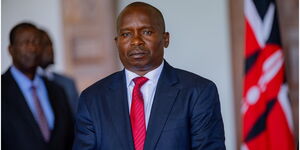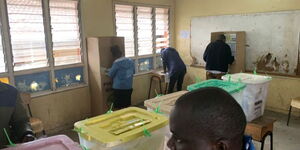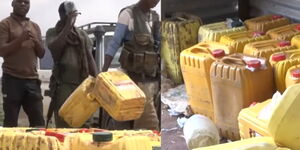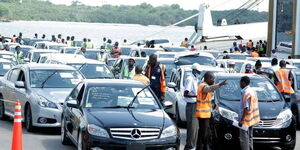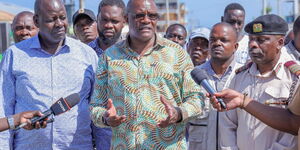Prime Cabinet Secretary Musalia Mudavadi was on Wednesday pressed to explain President William Ruto's decision to increase taxes despite the existence of other options to raise government revenue.
Bloomberg TV interviewer, in her question, wondered that aside from taxes, the Kenyan government had the opportunity to privatise state firms and increase their revenues in the process.
"Part of this idea of tax hikes being put on to target the debt policy. Why do it now at a time when the Kenyan Government has other options, for example privatising state-owned firms to really generate the growth of the company?" Posed journalist Kriti Gupta.
In response, Mudavadi argued that since the state was moving away from relying on debt, there was need to raise its own revenue.
He, however, observed that privatisation of state firms would take a longer time to realise and without the tax enforcement, the state would be left in a tough fiscal shape.
"Fiscal consolidation requires that we actually live within our means and the privatisation programme is going to go on in parallel. But getting the private sector in terms of privatisation takes quite a bit of time. It is something that we must run in parallel with other measures.
"Clearly, we do not have the fiscal space that one would expect us to have and, therefore, we will have to raise some of the revenues locally. Part of these involves not just raising taxes in specific areas but also making sure there is less pilferage when it comes to tax collection."
In President William Ruto's first year, a slew of new taxes have already been implemented with the aim of increasing state revenues.
For instance, beginning July 2023, all formally employed Kenyans now part with 1.5 per cent housing levy to deliver the affordable housing project as well as digital economy tax.
At the same time, the state raised the value added tax on fuel from eight per cent enjoyed during Uhuru Kenyatta's regime to 16 per cent.
Privatisation of Firms
The regime has also rolled out the process of leasing key state assets to private companies starting with births at both the Mombasa and Lamu ports.
On Monday, Kenya Ports Authority managing director William Ruto unveiled tenders surrounding the development and operation of port assets through public private partnership (PPP).
The properties to be leased include Lamu Container Terminal Berths 1 to 3, Lamu Special Economic Zone, Mombasa Port’s Berth 11 to 14 and Mombasa Port Container Terminal 1.
With the lease, the government aims at unlocking an additional Ksh1.46 trillion ($10 billion) at the port while attracting Ksh44.5 billion ($304 million) worth of investments at various ports from private companies.

